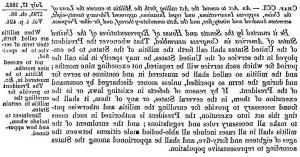By Susan Martin, Senior Processing Archivist
I’ve been wanting for some time to write about the fascinating Civil War journal of Howard J. Ford, which the MHS acquired four years ago. Howard served as a private in the 43rd Massachusetts Infantry, otherwise known as the “Tiger Regiment.” His journal consists of loose pages written between 11 September 1862 and 2 May 1863 and sent at intervals to his family back home in Cambridgeport, Mass. The journal contains incredible details and vivid descriptions, not to mention sketches and maps, making it a unique and indispensable account of the war.
Howard was born in Boston on 10 July 1832, the oldest of six children of Nancy (Richardson) Ford and John Ford. I couldn’t find much information about Howard’s life prior to the war. I know he worked as a printer, as recorded in Massachusetts Soldiers, Sailors, and Marines in the Civil War. In fact, this profession ran in the family; his father John and uncle Daniel Sharp Ford also worked in publishing, and his father-in-law Andrew Reid was the founder of the Cambridge Chronicle.

In the summer of 1862, after over a year of heavy fighting, the Union needed fresh troops. President Lincoln issued the Militia Act, which called for the enlistment of 300,000 volunteers as “nine month men” and threatened conscription in any state that didn’t meet its quota. The 43rd was one of many northern regiments organized in response to this act. On 4 September 1862, at the age of 29, Howard joined up, leaving behind a wife and two young children (their son was 2 ½, and their daughter less than four weeks old). Enlisting alongside Howard was his 18-year-old brother George.
Howard’s journal begins on 11 September, just one week later. He and George would both be mustered into Company I and spend less than two months training at Camp Meigs in Readville, Mass., before their regiment shipped out for the south. In the coming weeks, I’ll be telling you more about Howard’s experiences as he described them.
In addition to journal pages, the collection includes one other document, a heartfelt letter written by Howard’s mother Nancy on 23 February 1863. In honor of the upcoming Mother’s Day, I’ll inaugurate this blog series by quoting from her letter.
We unexpectedly received a letter from you, and thank you for it. We have read your journal with a great deal of interest and pleasure. […] I have felt great anxiety during all this time, and shall continue to feel it for you and George. If I did not I should not have a Mothers nature. A Mother can never forget her children no never. […] When we have a snow or rain storm, I think of my Soldier Sons. When the Thermometer is 15 below zero, or the wind is blowing a gale, or the mud is ankle deep then again do I think of my Solder Sons. When I go to bed, I think of them on guard, or lying on the cold ground or on the soft side of a pine board. In the morning I think will my Sons be called into action today are they on the march […] You may call this weakness or by what name you please. I call it Mothers love.
Stay tuned for more on Howard J. Ford.


